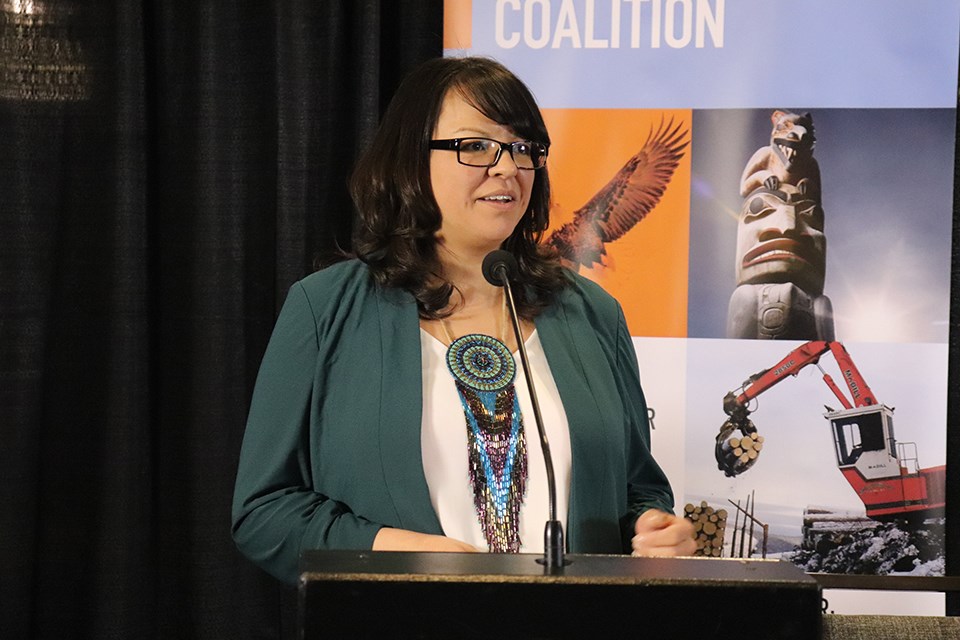A coalition of First Nations wants to have a say on how the federal government implements a new benefit-sharing framework for major resource projects.
The First Nations Major Projects Coalition (FNMPC) is calling on Canada with specific recommendations for the development of the government’s new national benefit-sharing framework for major projects on Indigenous territory.
Chief Sharleen Gale, chair of the FNMPC, announced the eight recommendations at the third annual FNMPC conference in Prince George today (March 3).
“Our members have asked us to explore a number of options designed to support their ability to participate as equity owners in a variety of major projects,” explained Gale.
The FNMPC works to establish the conditions for First Nations to fully participate in the wealth being generated from Indigenous territories.
In recent years, many FNMPC members have been forced to forfeit benefits from projects because capital to invest could not be facilitated at competitive rates.
“Access to capital to facilitate the participation as equity partners in these projects remains a significant challenge for our members,” said Gale.
Currently, FNMPC is active in providing support to its members on four major projects in three different regions in Canada all with an equity component.
In December 2019, Prime Minister Justin Trudeau identified the establishment of a new benefits sharing framework in his mandate letters to the Minister of Crown Indigenous Relations and the Minister of Natural Resources.
"The development of a national benefits framework provides the government of Canada with an opportunity to effect change that can bring Indigenous communities into the mainstream of our economy. This can be done by empowering us with the means to take our rightful place as partners in the wealth being generated from our territories through ownership," said Gale.
“It is in the view of the Major Projects Coalition that Canada should take [our] recommendations to ensure the establishment of the framework adequately addresses the needs and objectives of Indigenous nations at the community level."
Chief Corrina Leween of the Cheslatta Carrier Nation explained how difficult it is for First Nations get on the ground level for major projects happening in their territory.
“Access to capital necessary to invest is a huge problem,” she explained.
Leween says in the summer and fall of 2019, Cheslatta participated in the commercial auction to purchase a portion of the 65 per cent equity that was for sale by TC Energy in the Coastal GasLink Liquid Natural Gas Pipeline project.
“Cheslatta was squeezed out of this opportunity because the cost of capital available to First Nations in the commercial markets were uncompetitive.”
She says this experience underscores a large problem facing many First Nations on a variety of projects across Canada.
“What I want to see for my community is the opportunity to get in at the ground level as projects go on and to have a real say. We want the opportunity to co-develop projects and to navigate the regulatory requirements with the proponent and to have a seat at the project governance table.”
FNMPC says the recommendations draw from its work to overcome barriers faced by Indigenous communities in accessing capital as well as FNMPC’s direct involvement in supporting Indigenous nations in pursuing equity ownership in major natural resource projects.
“I see the establishment of the national benefits sharing framework as an opportunity for our communities and the major projects coalition to establish and work with government to get the policy right,” said Leween.
“First Nations should not be squeezed out of an economic opportunity on our own territories and I think we can get to the point where we have the tools in place to proceed.”
Chief Gale and Leween were also joined by Niilo Edwards FNMPC Executive Director, John Gamble, President and CEO of the Association of Consulting Engineering Companies – Canada and Mark Romoff, President and CEO of The Canadian Council for Public-Private Partnerships.
FNMPC’s eight recommendations for the framework’s implementation are as follows:
- Leverage available tools within the federal fiscal framework to establish a program designed to support Indigenous groups with access to capital (such as loan guarantees) for a wide variety of resource projects
- Ensure maximum flexibility of those tools and programs to be able to support Indigenous groups with ownership objectives over a wide variety of project dynamics and asset classes
- Develop and sustain an Indigenous major projects capacity fund to support Indigenous communities with professional advice and counsel necessary to undertake independent due diligence on projects. Thereby, establishing a composition for I informed decision about participation and benefits in major projects at both the First Nations leadership and community level
- Engage with Indigenous Nations and Indigenous organizations on the development of qualifying criteria to define the size and scale of major projects and determine how the national benefits sharing framework would support Indigenous involvement in those projects
- Engage with Indigenous Nations and Indigenous organizations on the development of qualifying criteria to define the size and scale of major projects and determine how the national benefits sharing framework would support Indigenous involvement in those projects
- Establish joint-engagement and collaboration with Industry and institutional sectors to support First Nations equity ownership across all sectors in the context of Indigenous rights and reconciliation
- Work with First Nations to design the appropriate mechanism that ensure benefits flow to community-level priorities
- Ensure that benefits are established in a setting that confirms a rigorous and robust environmental review process that adheres to standards adopted by First Nations communities

